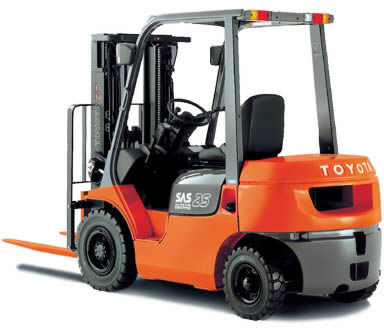Rev Up Your Productivity: Expert Tips for Toyota Forklift Service and Repair
Rev Up Your Productivity: Expert Tips for Toyota Forklift Service and Repair
Blog Article

In the bustling world of warehouses and logistics, efficiency is paramount. A dependable forklift, especially a Toyota, plays a crucial role in maintaining productivity and ensuring smooth operations. However, like any piece of heavy machinery, these forklifts require regular service and repair to keep them running at their best. Understanding the significance of Toyota forklift service repair can save your business time and money while enhancing the lifespan of your equipment.
As we delve into the world of forklift maintenance, it becomes clear that proactive care is essential. Neglecting routine service can lead to costly breakdowns and unscheduled downtimes, which can disrupt the flow of work and reduce overall efficiency. In this article, we will explore expert tips and best practices for Toyota forklift service repair, equipping you with the knowledge needed to rev up your productivity and keep your fleet in top shape.
Essential Maintenance Practices
Regular maintenance is crucial for the optimal performance of Toyota forklifts. Conducting daily inspections will help identify any potential issues before they escalate into more serious problems. Check essential components like the fluids, brakes, and tires to ensure they are in good condition. A thorough visual inspection can save time and avoid costly repairs later on.
In addition to daily checks, it's important to follow a scheduled maintenance plan recommended by Toyota. This includes servicing key parts such as the engine, hydraulics, and electrical systems at specified intervals. Consistent service not only extends the lifespan of the forklift but also enhances its reliability, keeping your operations running smoothly.
Lastly, employee training is a vital aspect of maintenance. Properly trained operators are less likely to misuse the equipment, which can lead to premature wear and damage. Investing time in training programs focused on safe operation and routine care ensures that your workforce knows how to handle Toyota forklifts effectively, ultimately boosting productivity.
Troubleshooting Common Issues
When it comes to Toyota forklift service repair, identifying problems promptly is crucial for maintaining efficiency. One of the most common issues operators face is poor lifting performance, which can often be attributed to low hydraulic fluid levels. Regularly check the hydraulic fluid and ensure it is at the recommended level. If the fluid looks contaminated or is leaking, it may need to be replaced or the source of the leak repaired.
Another frequent challenge is the forklift's inability to start or frequent stalling. This issue may indicate a dead battery or faulty connections. Inspect the battery terminals for corrosion and ensure they are tightly connected. If the battery is old, it might be time for a replacement. Additionally, checking the fuel system for blockages or empty tanks can also help in resolving starting issues.
Tires on Toyota forklifts can be another concern, particularly if they are worn or damaged. Worn tires can affect handling and create a safety hazard. Regularly examine the tires for signs of wear and replace them if necessary. Ensuring proper tire pressure also contributes significantly to overall performance. Addressing these common issues swiftly can help optimize productivity and extend the lifespan of your Toyota forklift.
Choosing the Right Parts
When it comes to Toyota forklift service repair, selecting the right parts is crucial for maintaining optimal performance and ensuring safety. Genuine Toyota parts are specifically designed for your forklift model, which guarantees compatibility and longevity. While aftermarket options may seem appealing due to lower costs, they often lack the same level of quality and reliability. Investing in authentic parts can save you from future complications and repairs that may arise from using inferior components.
Understanding the specific needs of your forklift is essential when choosing parts. Factors such as the model, year of manufacture, and intended usage all play important roles in determining the right components. Make sure to consult your owner’s manual or reach out to a certified Toyota dealer for recommendations to ensure you are getting the right fit. Using the correct parts tailored for your specific equipment will not only enhance performance but also extend the lifespan of your forklift.
Additionally, consider the sourcing of your parts. Purchasing from authorized dealers or reputable suppliers guarantees that you are receiving quality products backed by warranties and assurances. This can be particularly important in the event of future service repair needs, as having a reliable source for parts can expedite any required fixes. Investing time in selecting the right parts will pay off in reducing downtime, enhancing productivity, and maintaining the overall efficiency of your Toyota forklift.
When to Seek Professional Help
Recognizing when to seek professional help for Toyota forklift service and repair is crucial for maintaining operational efficiency. If you notice unusual noises, performance issues, or warning lights on the dashboard, it could indicate underlying problems that require expertise. Ignoring these signs can lead to more severe damage and increased repair costs, making it essential to get professional assistance sooner rather than later.
https://toyota-forklift-manual.com
Another indicator that it's time to call in experts is when your forklift experiences frequent breakdowns or requires repetitive repairs. This not only disrupts your workflow but can also jeopardize workplace safety. Skilled technicians can diagnose persistent issues and implement lasting solutions, ensuring that your equipment remains reliable and efficient over time.
Lastly, staying compliant with safety regulations is paramount. If your Toyota forklift is due for a scheduled service or inspection, do not hesitate to reach out to professionals. Regular maintenance by trained specialists helps to spot potential risks and keep your equipment in top condition, ultimately safeguarding your workforce and optimizing productivity.
Report this page